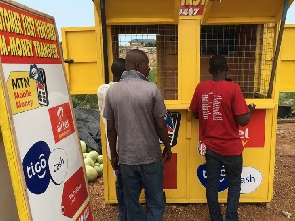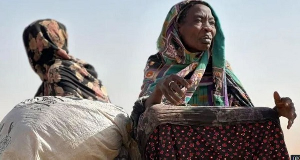A GNA feature by Bertha Badu-Agyei
Koforidua, Oct. 22, GNA - One of the clich=E9 for which President John Agyekum Kufour would be remembered for when he leaves office in the business development sector is "Golden Age Of Business". In recognition of the pivotal role of the private business in the development of the economy and as a mark of attention towards that sector after its long neglect, the golden age of business was declared to enhance the private sector to boost its contribution towards the economy.
The recognition and attention that had been shifted onto the private development sector was not left at the declaration alone, the Ministry of Private Sector Development and the President's Special Initiatives, were set up to give a State level support to the private business sector and a form of a leverage.
Government also realized that there were categories of businesses, therefore, the need to set up a fund to cater for the loan needs of the small- scale industries, which resulted in the establishment of MASLOC two years ago to redress the negligence of the small enterprises. One would have thought that with all these strategic interventions, private businesses would have now found leverage in the State's interventions to enable them to operate in a free and conducive environment without any hitch, but that is far from the realities on the ground.
The sudden emergence of private businesses or small scale-industries may tempt one to say that the business environment is good, but it is the surface that appears easy, the challenges and frustrations in the private sector ranges from capital, location, logistical inputs and other challenges.
Under the Ghana Journalists Association (GJA) Business Advocacy Project, members of the Media toured some selected small business in the Eastern Region to know the challenges and problems of their businesses. It was revealed that small businesses such as dressmaking, carpentry works and hairdressing, which are all in the informal sector, had no access to loan facilities.
Another grave challenge facing them is how to acquire a land and put up either a wooden structure or a metal container and exorbitant rent.
Some operators out of ignorance had not registered their businesses under any category, therefore, could not access credit facilities at the banks.
The New Juaben Secretary of the Ghana National Tailors and Dressmakers Association (GNTDA), Mrs Gladys Ansah, revealed that many members of their association were closing down their business for lack of finance and other logistical constraints coupled with low customer attraction.
She complained about the huge demand for land tenancy deposits; artisan fees and other exorbitant fees charged by the District Assemblies. She said the assemblies fixed the fees arbitrarily without consulting them and did not provide them with any support and thus indirectly frustrating them.
Mrs Ansah said it was a pity that businesses in the informal sector were making an enormous impact on the issue of unemployment since they trained a chunk of the youth, who could not go through formal education, and called for the establishments of a cooperative fund purposely to cushion them to enable them to continue.
Many lucrative businesses are perishing for lack of support, a garlic and honey wine manufacturing centre at Somanya, is only in existence due to the large stock it had produced some months ago in anticipation of an ejection threat from the land on, which the factory is situated.
The owner of the company, Mr Samuel Apana, told the GJA Team in his house turned wholesale that, he had been ejected from the factory due to a huge demand of land deposit demanded by the owner and as a result about 50 workers of the factory had been sent home until they could find a suitable place for production.
Mr Apana recounted the many attempts he had made to acquire a loan facility from the banks to salvage the business but to no avail and expressed worry for the 50 workers, whom he had sent home. The story of the Garlic and Honey factory, the revelations of the GNTDA are a few of the many challenges and frustrations that small scale and indigenous businesses are facing not only in the Eastern Region but across the length and breadth of the country and one wondered if they really had a stake in the development of the economy.
It is widely known that even with the low resource base, poor technical and managerial skills, small and medium enterprises collectively employ more people in Ghana than large scale industries in the same manner as it does in the informal training for people to acquire livelihoods.
Mr Kwasi Afriyie-Badu of KAB Consult, the service provider of the BUSAC Fund, stressed that the economy of Ghana could not develop without efforts to bring on board the private sector, especially the small-scale enterprises to a level where they could pay realistic taxes. The revelations brought to the fore through the Ghana Journalists Association (GJA) Business Advocacy Project must be a wake up call to the Government and a message to the various Presidential Candidates to tell the electorate about their plans in redressing the challenges faced by the private sector and businesses. As the popular saying goes, "hungry people do not appreciate democratic cultures", if people's businesses, which happen to be their sources of livelihoods are collapsing for lack of support, it is not far from a time when no one would even listen to political messages or let alone go to vote. Democracy can only thrive when people fell comfortable with the system. 22 Oct. 08
Opinions of Saturday, 25 October 2008
Columnist: GNA














